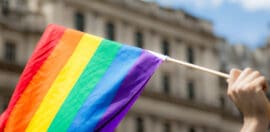What Australia thinks about Roe v Wade

Picture: Steven Saphore, AAP
1 July 2022 at 5:56 pm
Advocates in Australia have called on governments to do more to ensure abortion is not only legal, but accessible.
It was the decision that rocked the United States – but its ripples have been felt here in Australia too.
When the Supreme Court of the United States voted last week to strike down the landmark Roe v Wade decision – which granted pregnant women the constitutional right to an abortion – commentators and women’s rights organisations back home were quick to condemn the decision as a step backwards for human rights.
But the responders all had another thing in common too: they acknowledged that despite legal protections for abortion in Australia, access to it remains difficult and should be improved.
Here, we share some of the responses to the Supreme Court’s shock decision:
MSI Australia (formerly Marie Stopes Australia) this week released its Australian Abortion Access Scorecard in response to Roe v Wade being overturned. It noted that there are different levels of access to abortion in each state and territory. MSI Australia managing director Jamal Hakim said it was time to reform laws and invest in universal access across Australia.
“Abortion access is still a postcode lottery in Australia. To end the postcode lottery we need to harmonise state and territory legislation alongside investing in universal abortion access and embed abortion care in the healthcare system,” he said in a statement.
Children by Choice released a position statement on Roe v Wade, signed by dozens of women’s health organisations, calling for all state, territory and federal governments to embed abortion into their public health systems as “essential reproductive healthcare”, acknowledging that while abortion is legal in Australia, there are barriers to access.
The statement also denounced the Supreme Court’s decision as “detrimental for millions of women, girls and anyone who may need to seek an abortion”.
The Human Rights Law Centre (HRLC) called the decision “devastating” and said it “highlights the need for vigilance in Australia”.
“Abortion is healthcare. Access to abortion is a human right. No one should fear prosecution and imprisonment for needing healthcare, but sadly, millions of women around the world do. And now, millions more will in the US,” said Adrianne Walters, associate legal director at HRLC.
She called for governments to “properly fund and support reproductive healthcare around Australia” to improve access to abortion.
Women’s Health Victoria released a statement on the ruling, calling for abortion in Australia to remain accessible. It said the Victorian abortion sector was “extremely concerned” about the Supreme Court’s ruling.
“Regressive abortion legislation worldwide has the potential to impact local providers and people needing services by making it harder to access services for fear of judgement and discrimination and abortion providers,” the statement said.
It added that although women in Victoria have the right to choose, there remained barriers for those seeking abortion, including location, cost, Medicare and visa status, language barriers, and social stigmas. The statement was endorsed by 24 women’s health organisations.
Van Badham, writing in The Guardian, said the decision had struck fear into communities far away from the United States, including in Australia and New Zealand. She said the decision of the Supreme Court showed that “it can happen anywhere, when vigilance is lost”.
“The long, slow pace of abortion reform in New Zealand and Australia has had to navigate the disproportional presence of anti-abortionists in institutions of real power, causing obstruction and delay and deprioritisation of reform even when the weight of public opinion was with the other side. Even in progressive Australia, abortion still remains in Western Australia’s criminal code,” she wrote.
Western Australia’s health minister has not committed to changing their abortion laws.
God gave us free will – but apparently the US Supreme Court think they know better.
— Van Badham (@vanbadham) July 1, 2022
Emily Maguire, writing in Women’s Agenda, noted that the Supreme Court’s decision “is a form of violence against women”.
“The overturning of Roe v Wade is a direct attack on the rights and lives of women, and it will disproportionately affect women of colour, women who are already experiencing violence, and women from low socio-economic backgrounds,” she wrote.
She urged women to use their “rage and fear” to rally against the decision.







